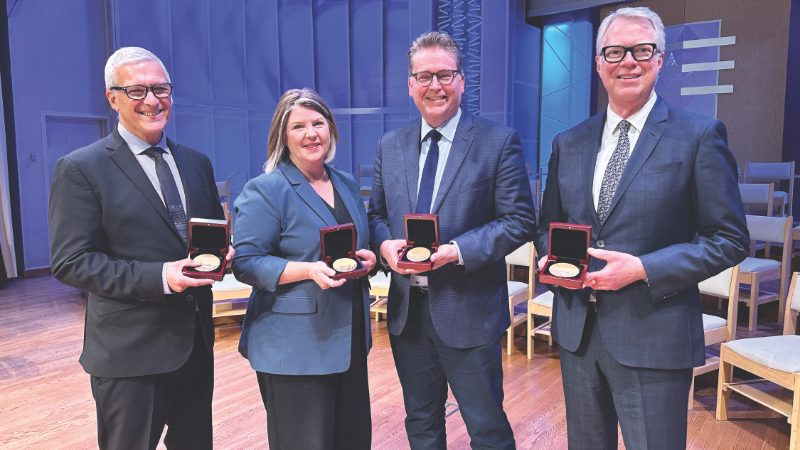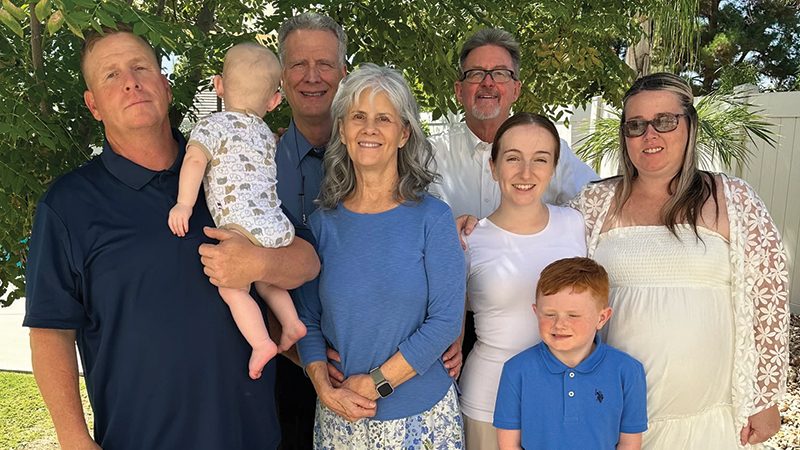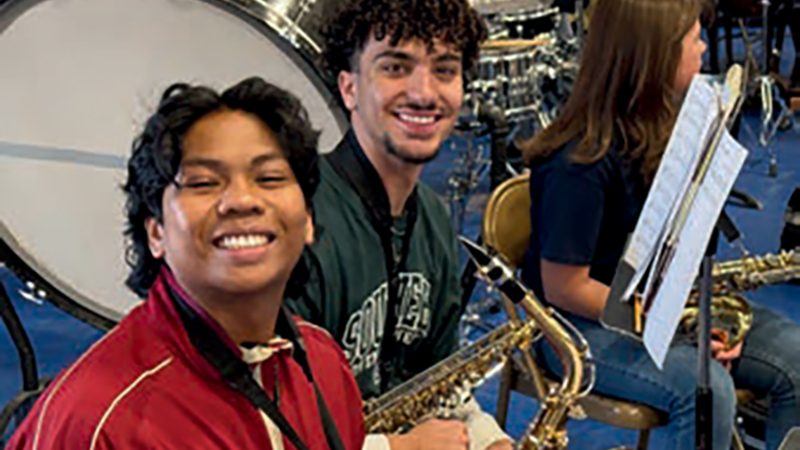In my lifetime there are three defining memories that have irreversibly shaped who I am. One was moving at age 15 to a foreign country where I did not speak the language and had to adapt to a new culture. Number two was meeting my future husband in my senior year of high school—it was the same year 9/11 happened. Finally, number three was sitting in a doctor's office and hearing the words “You have cancer,” just 4 months after getting married at the age of 22. It is impossible to look back on my life and imagine those experiences gone.
When you think about your life, what memories define you? Why is memory so important for us human beings? Why is memory an important part of our spiritual walk?
As a professor of psychology, I find the study of the brain fascinating. It is in this amazing organ where neurons communicate and create our thoughts and memory pathways that makes us intelligent beings with the ability to reason. Cognitive psychology is the area of psychology that studies the way people acquire, retain, transform, and use knowledge. As children, our memories start developing after age two or three, when language appears. Also, by two years of age, our brain has achieved 80% of its adult size.1 During childhood, the brain continues to evolve by forming synapses between neurons in a process called synaptogenesis. The more connections a child has, the more his or her ability to learn grows. By adolescence, this activity levels off; during adulthood, changes in the brain are very gradual until about 50 years of age, when brain activity starts declining.2 This research seems to indicate that the time before a child is 12 years old is crucial in the ability to develop the brain of a human being.
Scientists have classified brain memory in three categories:
- Sensory memory: Categorized as a short period of time, mere seconds in which you perceive the stimuli from your surroundings.
- Short-term memory: It is longer than sensory memory but still relatively short—just seconds or minutes—and restricted to a few elements, such as a phone number or some letters in a name.
- Long-term memory: It is relatively permanent and it can last minutes, hours, days, or decades, depending on reinforcement.3
Why are these scientific facts important to understand? As a Christian psychologist, I believe science and faith can coexist. But is memory even mentioned in God’s inspired Word? The words remember, do not forget, did not remember are often found there. In my initial search, I found over 50 verses, but there are more. Here are a few examples (with emphasis added):
“You shall not be afraid of them; you shall well remember what the Lord your God did to Pharaoh and to all Egypt” (Deuteronomy 7:18).4
“Remember also your Creator in the days of your youth, before the evil days come and the years draw near of which you will say, ‘I have no pleasure in them’” (Ecclesiastes 12:1).
“Remember the former things long past, For I am God, and there is no other; I am God, and there is no one like Me” (Isaiah 46:9).
“In all things I have shown you that by working hard in this way we must help the weak and remember the words of the Lord Jesus, how he himself said, ‘It is more blessed to give than to receive’” (Acts 20:35).
“So remember what you have received and heard; and keep it, and repent. Therefore if you do not wake up, I will come like a thief, and you will not know at what hour I will come to you” (Revelation 3:3).

Clearly it is important to God that we remember and keep our memories alive of Him
and His word. Since He created us, He understands that as humans we forget about spending time with Him, we forget to study His Word, we forget to teach our children about Him. God is saying remember, remember!
So how can we as Christians do a better job of keeping Christ's memory alive in our lives?
In my physiological psychology class, we had a discussion about why it is important to attend church. Is it worth it? Does it help with our spiritual walk? Myers and Jeeves, the authors of the best-selling book Psychology Through the Eyes of Faith,5 cited a study of Thomas Crawford from the University of California. Crawford found that sermons in church sometimes have an insignificant impact on our lives. Does that mean we should not go to church? No! That is not what I’m saying at all. It means that pastors, professors, teachers, and all of us need to be more intentional in the way we teach/learn and transfer information from sensory memory to long-term memory.
Some good examples of how we can retain information are given by Myers and Jeeves:
- Have evocative and realistic examples when preaching or applying the lessons learned in a practical manner to our lives.
- Provide messages that are relatable or remember personal experiences that make the Word of God easier to remember. This is how Jesus preached, right?
- Memory is best served when you have spaced repetition. It is the same for tests, which sometimes my students forget. Don’t cram—study a little bit here and there and the knowledge will stay with you for a long time.
- Engage in the learning process by participating in group discussion, and explain the information in your own words.
- Finally, take action and apply it to your life in some way or another. Pastors can give examples of how to apply their sermons to their parishioners' lives. As a professor, I find that students remember more and their learning attitude changes when they take action in class and participate in the teaching and learning themselves.
God wants us to use our knowledge of the Bible and take action. Sharing your testimony with others is the most powerful memory provoking tool. “Go, therefore, and make disciples of all nations, baptizing them in the name of the Father and of the Son and of the Holy Spirit, teaching them to observe all that I have commanded you. And behold, I am with you always, to the end of the age” (Matthew 28:19-20).
Music is also a very important part in the process of creating memories. In a study by Clark and Warren in the Journal of Neurology,6 it was found that music sets free memories and cognitive abilities lost in Alzheimer patients. It is a source of hope and comfort for people going through life with this disease. The study of the brain in relationship with music and memory is fairly recent but extremely encouraging.
I remember that when I was a child my parents played a Christian radio station almost every day. As a musically inclined individual, I find that I can still remember songs and memory verses that I learned as a child through music. Those songs have helped during periods of discouragement in my life.
If you are a parent, how can you instill God’s memory in your children while they are young?
It is such a big responsibility to be a godly parent. Here is a Bible verse that promotes action as a parent to increase memory: “Train up a child in the way he should go; even when he is old he will not depart from it” (Proverbs 22:6). Another verse: “You shall teach them diligently to your children, and shall talk of them when you sit in your house, and when you walk by the way, and when you lie down, and when you rise (Deuteronomy 6:7). Technology is playing such a big role in our children’s education, and we must be vigilant and make Christ a priority in our children’s memories.
Ellen G. White says: “Every child may gain knowledge as Jesus did. As we try to become acquainted with our heavenly Father through His word, angels will draw near, our minds will be strengthened, our characters will be elevated and refined. We shall become more like our Savior” (The Desire of Ages, p. 70). One of the goals my family and I decided to pursue was to memorize Scripture. It is a legacy my parents instilled in me, and I want to pass it on to my children.
My defining teen and young adult memories were a mix of adventure, excitement, and companionship, but they also involved pain and suffering. I’m sure that your own memories also have those components. We live in a sinful world, and we seem to not escape bad memories. However, there is hope for us and healing is coming. A beloved author wrote, “We have nothing to fear for the future, except as we shall forget the way the Lord has led us, and His teaching in our past history” (Ellen G. White, Selected Messages, Book 3, p. 162). God in His Word promises that “He will wipe away every tear from their eyes, and death shall be no more, neither shall there be mourning, nor crying, nor pain anymore, for the former things have passed away” (Revelation 21:4). God will take our painful memories and give us a new and redemptive life in heaven. We will be new, and we will not suffer anymore. Let's never forget but always remember what an amazing hope we have.
_____________________________
Libna J. Arroyo is assistant professor in the psychology and social work department at Pacific Union College.
1 A.E. Lyall, P. Savadjiev, M.E. Shenton, and M. Kubicki, “Insights into the Brain: Neuroimaging of Brain Development and Maturation,” Journal of Neuroimaging, Psychiatry, and Neurology 1 (2016), pp. 10-19.
2 C.S. Tamis-Lemonda, Child Development: Context, Culture, and Cascades (Oxford University Press, 2022).
3 N.W. Carlson, Foundations of Behavioral Neuroscience, 10th ed. (Boston, MA: Allyn and Bacon, 2014).
4 All Scripture quotations are from the 2001 English Standard Version. ESV Online. https://esv.literalword.com/
5 David Myers and Malcom Jeeves, Psychology Through the Eyes of Faith, 2nd ed. (San Francisco: Harper, 2003).
6 C.N. Clark and J.D. Warren, “Music, Memory and Mechanisms in Alzheimer’s Disease,” Brain: A Journal of Neurology, vol. 138, no. 8 (2015), pp. 2122–2125. https://doi.org/10.1093/brain/awv148






